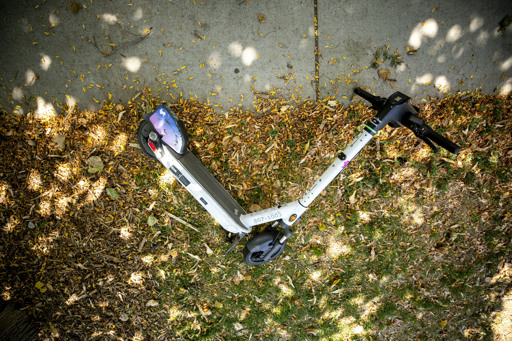spoiler
The Denver City Council on Monday adopted a new law that will set significant limits on how rented scooters and bikes can be used around the city.
“Denver is saying yes to innovation, but no to chaos,” said Councilmember Chris Hinds, one of the co-sponsors of the bill.
The city is home to roughly 4,000 scooters and e-bikes operated by the companies Bird and Lime. The new law is an effort to keep riders off the city’s sidewalks and to ensure that they don’t abandon the vehicles in annoying places when they’re done.
The bill passed unanimously.
Denver already sets rules about how and where scooters can be used, but this law represents a new approach.
Currently, much of the responsibility is on city authorities to penalize users for bad behavior. That almost never happens.
As of last year, police had ticketed only nine scooter riders since 2018, according to Hinds. After all, it can be difficult to identify a speeding scooter rider, or figure out who left a scooter in the creek.
Under the new approach, the city will fine the companies themselves for riders’ behavior. When city authorities find a misplaced scooter, they can simply put it on Bird or Lime’s tab.
The idea is to motivate the companies to police their own users in order to avoid fines. The companies could do so by taking strategies they’re already using — such as requiring users to take photos after parking a scooter or bike — and adding more of their own punishments or incentives for individual riders.
The law will also come with stricter parking requirements in some areas. In high-density zones — like downtown — riders will have to start and end trips at designated parking corrals.
Advocates have called for the city to get scooters out of the way. Michael Miller of the Lower Downtown Neighborhood Association said that scooters often block the sidewalks in his area, making his recovery from surgery more difficult.
“With limited strength and stability during my recovery, I often had no choice but to step into the street—an unacceptable and dangerous reality for anyone with restricted mobility,” he wrote.
Miller reported “scooter clutter” to the city more than 20 times, only to be told to contact the vendors instead — with few results. That could change as the companies are forced to take more responsibility.
San Francisco already employs a similar model, with city investigators issuing a $150 fine to the companies for each poorly parked scooter. In all, the city has fined local scooter operators more than $10 million. How will sidewalk sensors and knowledge tests work?
The law will also require that riders pass a knowledge test before renting a scooter or e-bike.
Meanwhile, the companies will have to make some changes to their vehicles and infrastructure. For one thing, Lift and Lime will have to install sensors that can detect when a scooter is operating on the sidewalk.
When a scooter is on the sidewalk, the companies will have to take action — for example, by increasing the rider’s bill, slowing the scooter or sounding an alarm.
The companies will also have to offer 5 percent of their fleets to people with disabilities, and they’ll have to submit anonymized data about crashes, sidewalk riding and other measures. What comes next?
The new law takes effect July 1, 2026. At least one of the scooter operators, Lime, is embracing it already.
“I think you all have struck the appropriate balance between statute and rulemaking. You have given [the city transportation department] and the vendors very clear directives while also allowing for different approaches to safety and parking challenges in different neighborhoods across Denver,” wrote Zach Williams, a local official with Lime, in an email to Hinds.
Cities including Chicago, New York and Charlotte have passed similar rules. The city of Denver is already working with Lime on mandatory parking zones around Union Station.
Additionally, sidewalk sensing technology is already required in cities like Chicago, where a Lyft-operated program has included it since 2023. Chicago also has mandatory parking zones.
Hinds has more ideas, too. San Francisco charges $100 for each vehicle the companies put on the road — and uses that money to build more bike racks. That could be an option for Denver, too, he said.
The bill was co-sponsored by council members Darrell Watson and Sarah Parady.

Since getting an ebike last November I’ve become a proper micromobility evangelical, but I hate these companies. They use gig workers as mobile mechanics and otherwise never seem to actually interact with their fleet, allowing users around here to throw them into waterways and block wheelchair access on sidewalks. When I move the bike it screams at me because I didn’t pay it for the privilege. My city refuses to just do those rentals through a municipal fleet or contract it out to the bike co-op that is a massive community asset. Instead we get all the externalised costs of Uber with terrible bikes/scooters and no safety equipment.
Make them bleed.
Still annoyed at the double standard cities have for bad micro mobility behavior over bad car behavior.
I’m glad Colorado cities, Denver included, are starting to use photo and radar-enforcement of speed limits. Aggressive and reckless drivers still have to be reported over the phone but speeding is automatically penalised. It’s so much safer for me to hold an AR-15 than drive my car to work through my city. That AR-15 points in exactly two directions- down or at a specific target. I can guarantee nothing will happen whether I’m alone or in a huge crowd because I strictly control the safety. No matter how safe I drive, I could kill someone or an animal the next time I do so. It’s so much easier to manage chaotic situations on a bike.
These fucking things are always left blocking the path. When it’s particularly egregious, I stop my electric unicycle and drag them out of the way and the goddamn things have the temerity to antitheft beep at me for moving them.
The rental escooters here are used as bowlingballs by students. There’s a wreck in every ditch. A sign that we can’t function in a utopia as a society.



